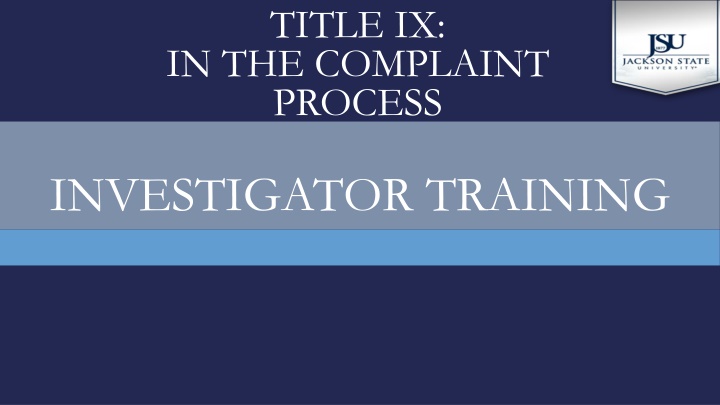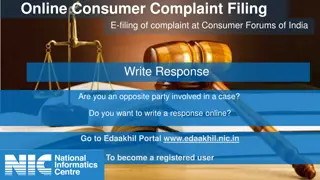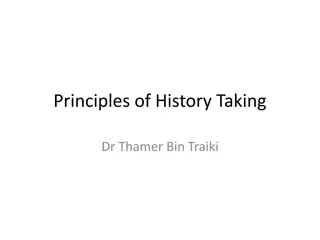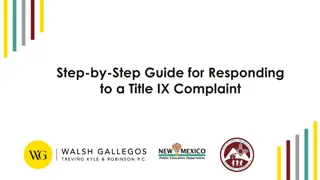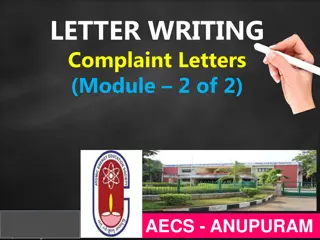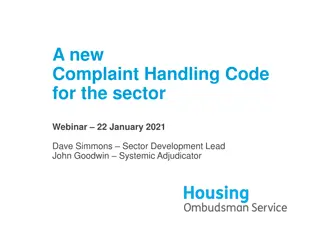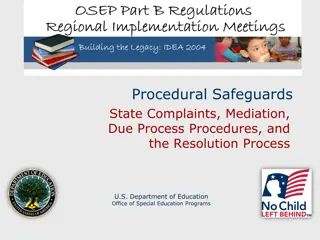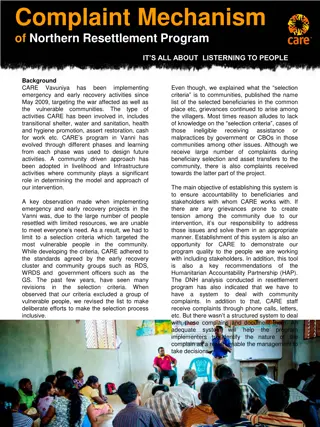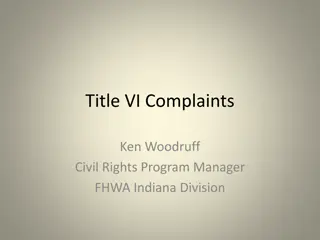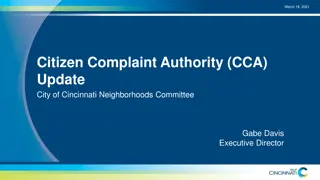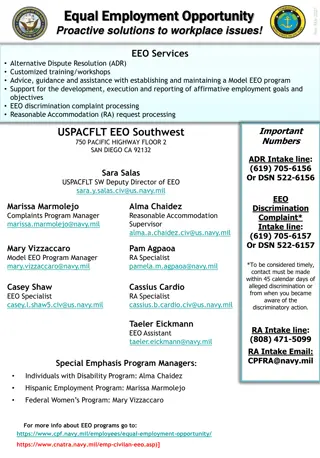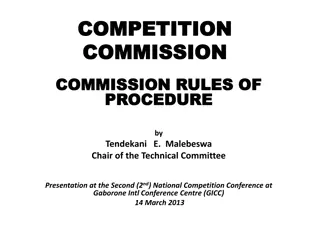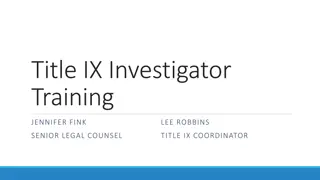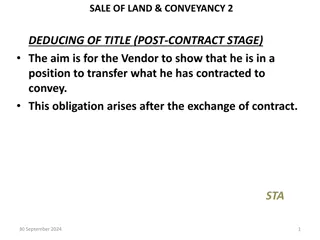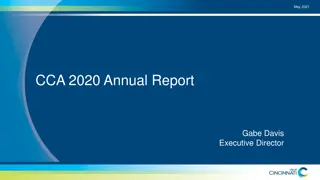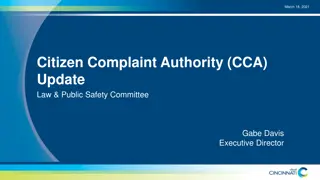Title IX Complaint Process Investigator Training Overview
This content provides a comprehensive guide to Title IX, including its purpose, procedures, training requirements, and the role of investigators and advisors in the complaint process. It covers the definition of Title IX, the purpose of procedures, the hearing process, and the training requirements for coordinators, investigators, and decision-makers. The content emphasizes the importance of addressing sex discrimination and sexual harassment and ensuring fair and impartial investigations and adjudications.
Download Presentation

Please find below an Image/Link to download the presentation.
The content on the website is provided AS IS for your information and personal use only. It may not be sold, licensed, or shared on other websites without obtaining consent from the author.If you encounter any issues during the download, it is possible that the publisher has removed the file from their server.
You are allowed to download the files provided on this website for personal or commercial use, subject to the condition that they are used lawfully. All files are the property of their respective owners.
The content on the website is provided AS IS for your information and personal use only. It may not be sold, licensed, or shared on other websites without obtaining consent from the author.
E N D
Presentation Transcript
TITLE IX: IN THE COMPLAINT PROCESS INVESTIGATOR TRAINING
INTRODUCTION: What is Title IX Purpose of the Title IX Procedures Training Requirement Definitions What is covered under Title IX Investigator s role Advisor s role during the hearing The hearing process Post-hearing process
WHAT IS TITLE IX? No person in the United States shall, on the basis of sex, be excluded from participation in, be denied the benefits of, or be subjected to discrimination under any educational program or activity receiving federal financial assistance. - TITLE IX OF THE EDUCATION AMENDMENTS OF 1972 The Title IX grievance process is codified in 34 CFR Section 106.45.
PURPOSE OF PROCEDURES Provide a grievance procedure addressing sex discrimination and sexual harassment, a form of sex discrimination, as prohibited under Title IX. Respond promptly and supportively to reports. Resolve allegations of sexual harassment with due process for all parties, maintaining impartially at all times. Effectively implement remedies addressing the conduct.
WHAT IS THE PURPOSE OF THE TITLE IX HEARING? Hear, consider and evaluate both testimonial and non-testimonial evidence Determine credible facts Apply relevant and credible facts to the policy Issue a written determination
TRAINING REQUIREMENTS 106.45(b)(1)(iii): A recipient must ensure that Title IX Coordinators, investigators, decision-makers, and any person who facilitates an informal resolution process, receive training on: The definition of sexual harassment in 106.30 The scope of the recipient s education program or activity How to conduct an investigation and grievance process including hearings, appeals, and informal resolution processes, as applicable, and How to serve impartially, including by avoiding prejudgment of the facts at issue, conflicts of interest, and bias. A recipient must ensure that decision-makers receive training on: Any technology to be used at a live hearing Issues of relevance of questions and evidence, including when questions and evidence about the complainant s sexual predisposition or prior sexual behavior are not relevant, as set forth in paragraph (b)(6) of this section. A recipient also must ensure that investigators receive training on issues of relevance to create an investigative report that fairly summarizes relevant evidence, as set forth in paragraph (b)(5)(vii) of this section. Any materials used to train Title IX Coordinators, investigators, decision-makers, and any person who facilitates an informal resolution process, must not rely on sex stereotypes and must promote impartial investigations and adjudications of formal complaints of sexual harassment.
TITLE IX COMPLIANCE PERSONNEL Title IX Coordinator: Coordinates [institution s] efforts to comply with [ ] responsibilities under Title IX and regulations. Must contact complainant, receive formal complaints, and authorize any investigations where the complainant does not participate. Must ensure procedural requirements for investigation/adjudication (e.g., proper notice, sufficient time) are followed. Must coordinate supportive measures. May not serve as adjudicator or fact-finder in hearing, or make ultimate decisions on responsibility/non-responsibility. Officials With Authority To Institute Corrective Measures: Any official, other than the Title IX Coordinator, who has authority under your institution s policies to institute corrective measures (such as discipline, no-contact orders, or other interim measures) in response to harassment. Investigators: Responsible for interviewing witnesses, collecting evidence, and preparing investigation report before hearing. May not serve as an adjudicator.
TITLE IX COMPLIANCE PERSONNEL (CONT.) Advocate/Advisor: The University is required to make available to the complainant and respondent an individual to contact cross- examination at the live hearing. May be made available prior to hearing; May be an attorney. Decision-Makers/Adjudicators: Responsible for deciding the ultimate question of responsibility or non-responsibility at a live, recorded hearing, and for determining disciplinary sanctions. Must make final determination, with assistance from investigation memorandum, on admissibility of evidence. Must prepare a written determination explaining result of hearing, including responsibility/non-responsibility, procedural steps in investigation, findings of fact, application of fact to institution policies, disciplinary sanctions, and appeal procedures. Must not be the same person as Title IX Coordinator or investigator. Appellate Decision-Makers Must review appeals by complainants or respondents for procedural errors or new evidence that could not have previously been presented. May not be the same person as Title IX Coordinator, investigator, or original decision maker.
WHAT DOES TITLE IX COVER?
TYPES OF POLICY VIOLATIONS Sex/Gender Discrimination Sexual Harassment which includes: Quid Pro Quo Sexual Assault Rape Acquaintance Rape Stalking Relationship Violence (Domestic and Dating Violence)
TITLE IX SEXUAL HARASSMENT TITLE IX SEXUAL HARASSMENT: Conduct on the basis of sex that falls within one or more of three categories: Quid Pro Quo Harassment: When an employee of JSU conditions the provision of an aid, benefit, or service of the University on an individual s participation in unwelcome sexual conduct. Hostile Environment Harassment: When conduct on the basis of sex is sufficiently severe, pervasive, and objectively offensive, as determined by a reasonable person, that it effectively denies a person equal access to JSU programs or activities. Objective and Subjective Requirements: The complainant must actually be subjectively offended AND the conduct must by judged by an objective reasonable person standard to be offensive. Severe or Pervasive: Another objective standard. Some actions, such as groping or direct insults or threats, may be harassment despite happening only one time, if a reasonable person could determine that one instance is pervasive enough to deny equal access. NOTE that this requirement only applies to Hostile Environment Harassment. Offenses like sexual assault and domestic violence need not meet the severe and pervasive requirement.
JSUS SEXUAL MISCONDUCT POLICY It is the policy of Jackson State University not to discriminate against any person on the basis of gender. The prohibition against gender based discrimination extends to all University educational programs and activities, as well as admission into such programs and activities. Harassment of employees or students based upon sex is prohibited. JSU expressly prohibits all forms of sexual harassment including sexual assault, sexual violence, sexual exploitation, dating violence, domestic violence, and stalking.
ROLE DURING INVESTIGATION Both the Complainant and Respondent have a right to have an advisor present during any meeting with Title IX. There is no formal role for the advisor prior to a hearing. A party may have up to two advisors if they choose. During the investigation, the role of the advisor is established by the Complainant or Respondent.
BASIC STEPS FOR AN INVESTIGATION SUPPORTIVE MEASURES NOTICE Institution offers complainant non-punitive support, potentially including alterations to schedules, counseling, no-contact orders. These must be offered and provided regardless of whether a formal complaint is filed, and irrespective of the outcome of any hearing. They may be temporary, or may last as long as needed. Title IX Coordinator Official with Authority learns of alleged sexual harassment HEARING A live, recorded hearing before a trained adjudicator, with direct cross- examination by advocates, at which determination of outcome is made APPEAL Review of hearing result by impartial party, either for procedural errors or newly discovered evidence INITIAL INVESTIGATION JURISDICTIONAL DECISION Determine whether matter falls within the scope of Title IX, and if not, under what procedures (if any) will it be investigated and adjudicated INVESTIGATIVE REPORT Written report by investigator(s) summarizing all relevant evidence, including evidence institution does not intend to present at hearing FORMAL COMPLAINT Initial notifications and meetings with accused party, witnesses; gathering of any documentary or other evidence Written complaint is submitted, signed by complainant or TIX Coordinator
YOUR ROLE AS AN INVESTIGATOR Your job as an investigator is to conduct an impartial investigation, collect the relevant facts whether they support guilt or innocence and summarize what you have found fairly and objectively for the Title IX Coordinator. You may not serve either as an advocate for a party or as an adjudicator. That would constitute a conflict of interest. You must strive to be unbiased. If you feel you have a bias for or against an individual, a group, or a general side (complainants/respondents), you must let the Title IX Coordinator know and recuse yourself. Being unbiased doesn t mean you don t draw conclusions. While the ultimate outcome is decided by an adjudicator, you may be asked to draw conclusions about relevance, credibility, and other issues in some situations for example, in helping the Coordinator prepare the Investigative Report. Your conclusions must be based on a fair and objective assessment of the evidence.
INVESTIGATION OVERVIEW Burden on Institution: The burden of proof and the burden of gathering evidence sufficient to reach a determination regarding responsibility rests on the recipient and not on the parties. (106.45(b)(5)(i)) You cannot simply ask the parties to provide all relevant evidence, as they may not know what that means. However, you generally cannot compel cooperation, which means the parties bear the responsibility of providing information that they are in the best position to know or provide. Try to ask more specific questions: Are there texts, social media messages, emails? Are there names of witnesses? People who were there shortly beforehand or shortly after? People to whom the parties described the events very shortly after they happened? Where relevant, you should independently follow up on leads e.g., locations that might have security footage if there is reason to believe it may reveal pertinent information. You are not required to be perfect, or be law enforcement, but you must make a good faith effort.
INVESTIGATION PROCEDURE Advance notice: Parties must be informed in writing of all meetings of any kind related to the investigation, including investigative interviews. This means date, time, location, and purpose. Notice must be sufficiently early to allow sufficient time for the party to prepare. Under new regulations, this means at least 24 hours in advance. Advisors: Parties must be informed in writing of their right to be accompanied to all meetings by an advisor of their choice. Parties must be permitted to view the evidence collected. This normally occurs through the pre-hearing report, but they may also request to review it sooner via written request to the Title IX Coordinator. The general rule is, try to be as evenhanded as possible given the particular facts of the case. Basic Rule of Thumb: If you are at all in doubt, call the Title IX Coordinator.
INVESTIGATION TIPS The default order for investigation usually looks something like: Receive formal complaint and provide written notices. Interview complainant. Interview respondent. Based on initial interviews (1) gather any documentary evidence; (2) identify and schedule interviews of potential witnesses. Interview potential witnesses. After reviewing documentary evidence and witness interviews, re-interview complainant and then respondent. This interview should focus on identifying any inconsistencies or potential weaknesses and giving parties an opportunity to address them. The timeline for investigation and adjudication is now reasonably prompt , which provides some flexibility. Where possible, interviews should either be witnessed by an additional institution employee or be recorded. Parties do change their stories, and you need to be able to verify what was said. There may be some exceptions, such as follow-up interviews to clear up minor details. Strong note-taking is important. Notes should be accurate and fair. Pause the interview as needed to make sure you are getting all relevant information. Be transparent with the parties. In some cases, an investigator may need to convey the opposing party s strongest position will be, and give the interviewee an opportunity to respond. This will help you uncover red herring issues and focus on the points and evidence that matter.
INVESTIGATION TIPS (CONT.) As an investigator, your role is neither prosecutor nor defense counsel. You are an objective and impartial fact-gatherer. Personal experiences, biases, or empathy cannot change the way you approach an investigation. It is possible to balance compassion and investigative rigor. During initial interviews, the best approach is to allow each party to tell their story in the manner they see fit, then to follow up with specific questions to fill in details. Interviews generally should not be games of gotcha, in which investigators try to catch parties in contradictions. If a statement seems inconsistent or contradicted by evidence, the best practice is to tell the interviewee your concern and give them an opportunity to provide an explanation. If a story doesn t hold together, that will become clear in time without the need for aggressive interrogation. Understand that both parties likely are under great stress. Provide ample time for them to answer, and understand that brief confusion or lack of recollection is not, in itself, evidence of fabrication. However, the mere fact that a party cannot recall information or has trouble recounting events should not be viewed as evidence of trauma suggesting that sexual violence occurred.
IRRELEVANT QUESTIONS Questions and evidence about the complainant s sexual predisposition or prior sexual behavior are not relevant, unless such questions and evidence about the complainant s prior sexual behavior are offered to prove: (1) that someone other than the respondent committed the conduct alleged; or (2) the questions and evidence concern specific incidents of the complainant s prior sexual behavior with respect to the respondent and are offered to prove consent. Questions that are duplicative or repetitive are also irrelevant.
IRRELEVANT QUESTIONS: QUESTIONS NOT PERMITTED Questions that seek information about any party s medical, psychological, and similar records are not permitted unless the party has given written consent. Questions regarding statements of personal opinion or statements as to any party s general reputation for any character trait are not relevant.
HEARING PROCESS: STANDARD OF REVIEW In order to determine whether the respondent has violated the University s Sexual Misconduct Policy, the standard of proof required is by a preponderance of the evidence, i.e. the evidence demonstrates that it is more likely than not that the conduct occurred.
UNLAWFUL DISCRIMINATION AND HARASSMENT The University is dedicated to enforcing civil rights laws to protect all students from unlawful discrimination and harassment based on race, color, national origin, sex, disability, and age. transgender, queer, questioning, asexual, intersex, nonbinary, and individuals who identify their sexual orientation or gender identity in other ways (LGBTQI+). This includes students who are lesbian, gay, bisexual,
SEXUAL HARASSMENT Sexual Harassment is any unwelcome conduct that a reasonable person would find so severe, pervasive and objectively offensive that it denies a person equal education access. person did not request or invite it and considered the conduct to be undesirable or offensive. Conduct is considered unwelcome if the
SEXUAL ASSAULT The term sexual assault means any nonconsensual sexual act including when the victim lacks capacity to consent.
SEX OFFENSES Any sexual act directed against another person, without the consent of the complainant, including instances where the complainant is incapable of giving consent. purpose of sexual gratification, without the consent of the complainant, including instances where the complainant is incapable of giving consent because of his/her age or because of his/her temporary or permanent mental incapacity. * Fondling The touching of the private body parts of another person for the within the degrees wherein marriage is prohibited by law. * Incest Sexual intercourse between persons who are related to each other age of consent. * Statutory Rape Sexual intercourse with a person who is under the statutory
DATING AND DOMESTIC VIOLENCE Dating/Domestic violence is a pattern of abusive behavior used to exert power and control over a partner. Dating/Domestic violence can be physical, sexual, emotional, or psychological actions or threats of actions that influence another person.
STALKING Stalking is a course of conduct directed at a specific person that would cause a reasonable person to fear for his/her safety or the safety of others, or to suffer emotional distress. Stalking may include repeatedly following, harassing, threatening, or intimidating another.
ESSENTIAL REPORTING REQUIREMENTS Once a faculty or staff member becomes aware of a situation involving sexual harassment or sexual misconduct, through actual or constructive notice, the information must be communicated to the Title IX office. Even if the individual does not plan to file a complaint with Title IX or does not want to speak with Title IX, Title IX still needs to be informed of the situation.
ESSENTIAL COMPLIANCE ELEMENTS JSU MUST take immediate and appropriate steps to investigate all allegations of sexual harassment and sexual misconduct JSU will respond promptly and effectively to: Stop the harassment or misconduct Remedy the effects Prevent the recurrence
ON-CAMPUS VS. OFF-CAMPUS Title IX applies to reports of sexual harassment in education programs and activities which include the following: Buildings or other locations that are part of the school s operations, including remote learning platforms; Off-campus settings if the school exercised substantial control over the respondent and the context in which the alleged sexual harassment occurred; and Off-campus buildings owned or controlled by a student organization officially recognized by the University, such as a building owned by a recognized fraternity or sorority.
WHO NEEDS TO REPORT? ANYONE who experiences, observes, or hears about an incident of sexual harassment or sex discrimination should report it to the Title IX Coordinator as soon as possible.
WHO DO I TELL? CAN I JUST TELL THE POLICE? Law enforcement involvement does not relieve the institution from investigating under Title IX. You may have a Title IX violation without a criminal violation (standard of proof is different). Complainant may not want to notify the police.
INVESTIGATIONS AND THE GRIEVANCE PROCESS: REPORTING PARTY/COMPLAINANT The investigation begins once Title IX receives notice of a complaint of sexual harassment. Notice to Title IX Trigger duty to investigate Supportive measures
WHAT MUST BE INCLUDED IN A TITLE IX COMPLAINT? A formal Title IX investigation cannot occur unless the complainant discloses his or her identity, the identity of the alleged perpetrator, and details about the alleged misconduct in a formal complaint.
INTERIM/SUPPORTIVE MEASURES Campus escort No Contact Order On-campus housing accommodations Counseling services Medical services Class accommodations Ban from campus/on-campus housing
INTERIM/SUPPORTIVE MEASURES Before a formal complaint is filed After a complaint is filed No complaint is filed
INVESTIGATIONS AND THE GRIEVANCE PROCESS: ACCUSED PARTY/RESPONDENT KNOWLEDGE OF TITLE IX VIOLATION: Respondents will receive notice of the pending allegations filed against them. The notice will also inform the Respondent of his/her right to have an advisor present when speaking with Title IX. The notice will state that retaliation is prohibited.
INVESTIGATIONS AND THE GRIEVANCE PROCESS Both Respondent and Complainant are entitled to an advisor during the hearing for cross-examination. Standard of Proof Preponderance of the Evidence. The Title IX Coordinator works closely with Student Affairs, Academic Affairs, Human Resources, Campus Police and other University offices when required.
INVESTIGATIONS AND THE GRIEVANCE PROCESS: FREQUENTLY ASKED QUESTIONS How does the University reach a decision? After a hearing, the parties will be notified of the findings of the adjudicators. The decision will identify the allegations, describe all events which occurred, identify the supporting facts, apply the policies to the facts, and provide a rationale for the decision and recommended sanctions.
INVESTIGATIONS AND THE GRIEVANCE PROCESS: FREQUENTLY ASKED QUESTIONS Are the individuals involved in the grievance process trained? In order to implement a fair and impartial process, all those involved in the grievance process will undergo Title IX training.
INVESTIGATIONS AND THE GRIEVANCE PROCESS: FREQUENTLY ASKED QUESTIONS Can the student appeal an adverse decision? Yes, the University must offer both parties the option to appeal regardless of the outcome.
INVESTIGATIONS AND THE GRIEVANCE PROCESS: POINTS TO REMEMBER The University is committed to ensuring a community that is safe for all who study, live, work, and visit here. Please report incidents of sex discrimination, sexual harassment or sexual violence. Though it may be difficult, immediate reporting allows for the best possible efforts to support the complainant, investigate the claims, and to prevent a recurrence.
DIVISION OF GENERAL COUNSEL TITLE IX General Counsel: Edward Watson, 601 General Counsel: Edward Watson, 601- -979 979- -3950 3950 Title IX Coordinator: LaShundra Jackson Title IX Coordinator: LaShundra Jackson- -Winters, 601 601- -979 979- -6804 6804 Winters, Title IX Investigator: Bryant Guy, 601 Title IX Investigator: Bryant Guy, 601- -979 979- -1315 1315 Title IX Cell Phone: 601 Title IX Cell Phone: 601- - 927 927- -4766 4766
DIVISION OF GENERAL COUNSEL TITLE IX Information regarding Title IX and the Title IX process can be found on the JSU website @ https://www.jsums.edu/titleix/
DIVISION OF GENERAL COUNSEL ADDITIONAL RESOURCES Jackson State University Department of Public Safety (601) 979-2580 Latasha Norman Counseling Center (601) 979-0374 Applied Psychological Services (601) 979-3381
